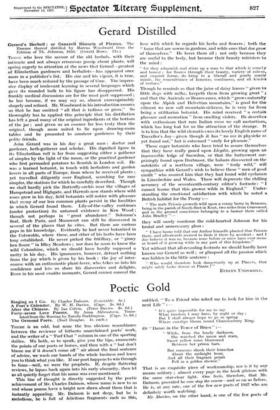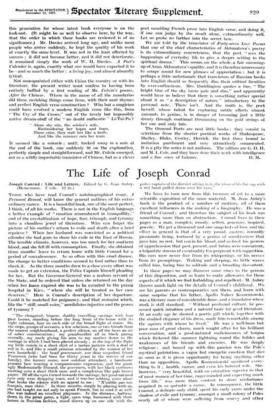Poetic Gold
TI1ERE is an odd, but none the less obvious resemblance between the reviewer of hitherto unacelaimed poets' work, and the writer of a " Turf Chat " column in one of the sporting dailies. We both, so to speak, give you the tips, enumerate the points of our poets or horses, and then with a " but don't blame me if it doesn't come off " air about the final sentence of advice, we wash our hands of the whole business and leave you to think what you like. If our poet happens to win through
to fame—well, we were the prophets. If, despite flattering reviews, he lapses back again into his early obscurity, then let us all quietly forget that his naMe was ever mentioned.
This line of thought is directly suggested by the poetic achievement of Mr. Charles Daimon, whose name is new to us and whose poems have a bright new sheen about them that is instantly appealing. Mr, Daimon is not deep; but he is melodious, he is full of felicitous fragments such as this, entitled, " To a Friend who asked me to look for him in the next Life " : —
" It's quite impossible for me to say
What freedom I may have, by night or day ; But I shall always hope to go in spring Where cowslips bloom round Chanctonbury Ring.
Or Dana6 in the Tower of Brass " :- " While, from the lonely darkness,
She watched the moon and stars, Sweet yellow roses blossomed Between her prison bars.
But someone shook their branches About the midnight hour, And all their fragrant petals Fell in a golden shower."
That is an exquisite piece of workmanship, nor is it by any means solitary ; almost every page in the book glistens with the same star-clear light. One feels, therefore, that Mr. Daimon, provided he can stay the course—and so on as tmefore. He is, at any rate, one of the few new poets of 1927 who are
definitely worth watching.
Mr. Davies, on the other hand, is one of the few poets of
this generation for whose latest book everyone is on the hook-out.. (It might be as well to observe here, by the way; that the order in which these books are reviewed is of no significance.) Mr. Davies arrived long ago, and unlike most people who arrive suddenly, he kept the quality of his work at exactly the same level: It was not in the least affected by success ; it did not become better, and it did not deteriorate, it remained simply- the work of W. H. Davies. A Poet's Calendar is, again, exactly what one 'would have expected it to be—and so much the better ; a living joy, and almost absurdly
lyrical.
Not unacquainted either with China the country or with its literature, the present writer must confess to having beeu entirely baffled by a first reading of Mr. Colvin's poems, After the Chinese. Where in the name of all the mandarins did these ravishing things come from, with their neat .rhymes and perfect English verse-construction ? Who but a-magician could have evolved a modern English verse like this, from " The Cry of the Crows," out of the lovely but impossibly native dream-stuff of the " no doubt authentic " Li-Tai-Po ?
" Alone she sits, the soldier's wife, Embroidering her hopes and fears, These cries, they stab her like a knife, And like the summer rain her tears.
It seemed like a miracle ; until, tucked away in a note at the end of the book, one suddenly lit on the explanation, perfectly simple and straightforward, and Mr. Colvin emerged, not as a wildlyimprobable translator of Chinese, but as a clever poet moulding French prose into English verse, and doing it,
• if one can judge by the result alone, extraordinarily well. Let us probe no further into the secret here.
We are told by the translator of Forty-seven Love Poems that one of the chief characteristics of Akhmatova's poetry is its extraordinary concreteness, that the poet " uses the happenings of everyday life to give a deeper setting to the spiritual drama." This seems, on the whole, a fair summing- up of Anna Akhmatova's quality, and it is therefore unnecessary to scrape round for new phrases of appreciation ; but it is • perhaps a little unfortunate that translators of Russian books into English should so frequently dim their critical faculties by over-enthusiasm. Mrs. Duddington quotes a line, " The bright blue of the sky turns pale and dim," and apparently would have us believe that there is something rather special about it as " a description of nature " introductory to the personal note. There isn't. And the truth is, the poet herself, whose talent for capturing subtle effects almost amounts to genius, is in danger of becoming just a little dreary through continual thrumming on the gold strings of her one and only lute.
The Ormond Poets are neat little books ; they consist in selections from the shorter poetical works of Shakespeare, Shelley, Blake, Cowley, Herrick, the first three bound in imitation parchment and very attractively ornamented. It is a pity the series is not uniform. The editors are G. D. H. and M. I. Cole, and they have done their work with intelligence



































































 Previous page
Previous page